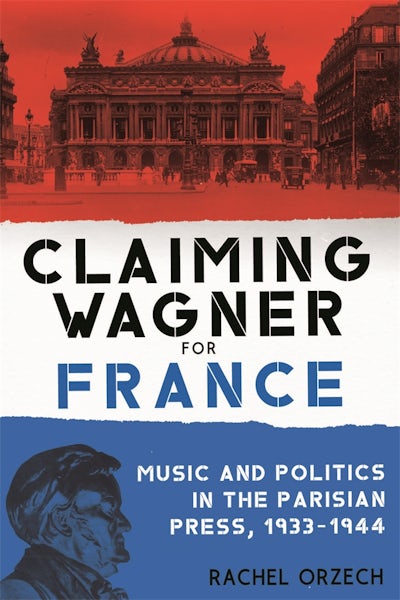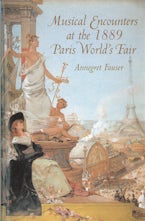
Title Details
272 Pages
22.8 x 15.2 cm
10 b/w illus.
Series: Eastman Studies in Music
Series Vol. Number:
181
Imprint: University of Rochester Press
Claiming Wagner for France
Music and Politics in the Parisian Press, 1933-1944
- Description
- Contents
- Author
- Reviews
A pathbreaking study of the Parisian press's attempts to claim Richard Wagner's place in French history and imagination during the unstable and conflict-ridden years of the Third Reich.
Richard Wagner was a polarizing figure in France from the time that he first entered French musical life in the mid nineteenth century. Critics employed him to symbolize everything from democratic revolution to authoritarian antisemitism. During periods of Franco-German conflict, such as the Franco-Prussian War and World War I, Wagner was associated in France with German nationalism and chauvinism. This association has led to the assumption that, with the advent of the Third Reich, the French once again rejected Wagner.
Drawing on hundreds of press sources and employing close readings, this book seeks to explain a paradox: as the German threat grew more tangible from 1933, the Parisian press insisted on seeing in Wagner a universality that transcended his Germanness. Repudiating the notion that Wagner stood for Germany, French critics attempted to reclaim his role in their own national history and imagination.
Claiming Wagner for France: Music and Politics in the Parisian Press, 1933-1944 reveals how the concept of a universal Wagner, which was used to challenge the Nazis in the 1930s, was gradually transformed into the infamous collaborationist rhetoric promoted by the Vichy government and exploited by the Nazis between 1940 and 1944. Rachel Orzech's study offers a close examination of Wagner's place in France's cultural landscape at this time, contributing to our understanding of how the French grappled with one of the most challenging periods in their history.
Richard Wagner was a polarizing figure in France from the time that he first entered French musical life in the mid nineteenth century. Critics employed him to symbolize everything from democratic revolution to authoritarian antisemitism. During periods of Franco-German conflict, such as the Franco-Prussian War and World War I, Wagner was associated in France with German nationalism and chauvinism. This association has led to the assumption that, with the advent of the Third Reich, the French once again rejected Wagner.
Drawing on hundreds of press sources and employing close readings, this book seeks to explain a paradox: as the German threat grew more tangible from 1933, the Parisian press insisted on seeing in Wagner a universality that transcended his Germanness. Repudiating the notion that Wagner stood for Germany, French critics attempted to reclaim his role in their own national history and imagination.
Claiming Wagner for France: Music and Politics in the Parisian Press, 1933-1944 reveals how the concept of a universal Wagner, which was used to challenge the Nazis in the 1930s, was gradually transformed into the infamous collaborationist rhetoric promoted by the Vichy government and exploited by the Nazis between 1940 and 1944. Rachel Orzech's study offers a close examination of Wagner's place in France's cultural landscape at this time, contributing to our understanding of how the French grappled with one of the most challenging periods in their history.
Acknowledgments
Contents
List of Figures
Note on Translations and Referencing of Press Sources
Introduction
1. A Universal Art: The Cinquantenaire, 1933
2. Ambassador of Peace: Rapprochement and Wagner, 1933-1939
3. Art and Patrie: The Bayreuth Festival, 1933-1943
4. A Sensitive Question: From Drôle de Guerre to Resistance, 1939-1944
5. Staging Collaboration: The Paris Opéra, 1939-1944
Conclusion: From Universalism to Collaboration
Bibliography
Index
Contents
List of Figures
Note on Translations and Referencing of Press Sources
Introduction
1. A Universal Art: The Cinquantenaire, 1933
2. Ambassador of Peace: Rapprochement and Wagner, 1933-1939
3. Art and Patrie: The Bayreuth Festival, 1933-1943
4. A Sensitive Question: From Drôle de Guerre to Resistance, 1939-1944
5. Staging Collaboration: The Paris Opéra, 1939-1944
Conclusion: From Universalism to Collaboration
Bibliography
Index
"A major contribution to our understanding of Wagner reception in France, Franco-German cultural relations during the 1930s, and musical life during the Occupation." Marie-Pier Leduc, REVUE MUSICALE OICRM
"[Brings] a significant new perspective to a much-discussed subject. Orzech argues that Wagner's music succeeded in transcending conflicts and politics by virtue of its supposed universality, thereby becoming 'emblematic of universality' and even perhaps of Franco-German rapprochement. The book's tightly defined analysis...brings a broad historical perspective to thinking about Franco-German relations." MUSIC & LETTERS
Hardcover
9781580469708
April 2022
$115.00 / £97.00
Ebook (EPDF)
9781800105041
April 2022
$29.95 / £24.99
Ebook (EPUB)
9781800105164
April 2022
$29.95 / £24.99
Title Details
272 Pages
2.28 x 1.52 cm
10 b/w illus.
Series: Eastman Studies in Music
Series Vol. Number:
181
Imprint: University of Rochester Press














